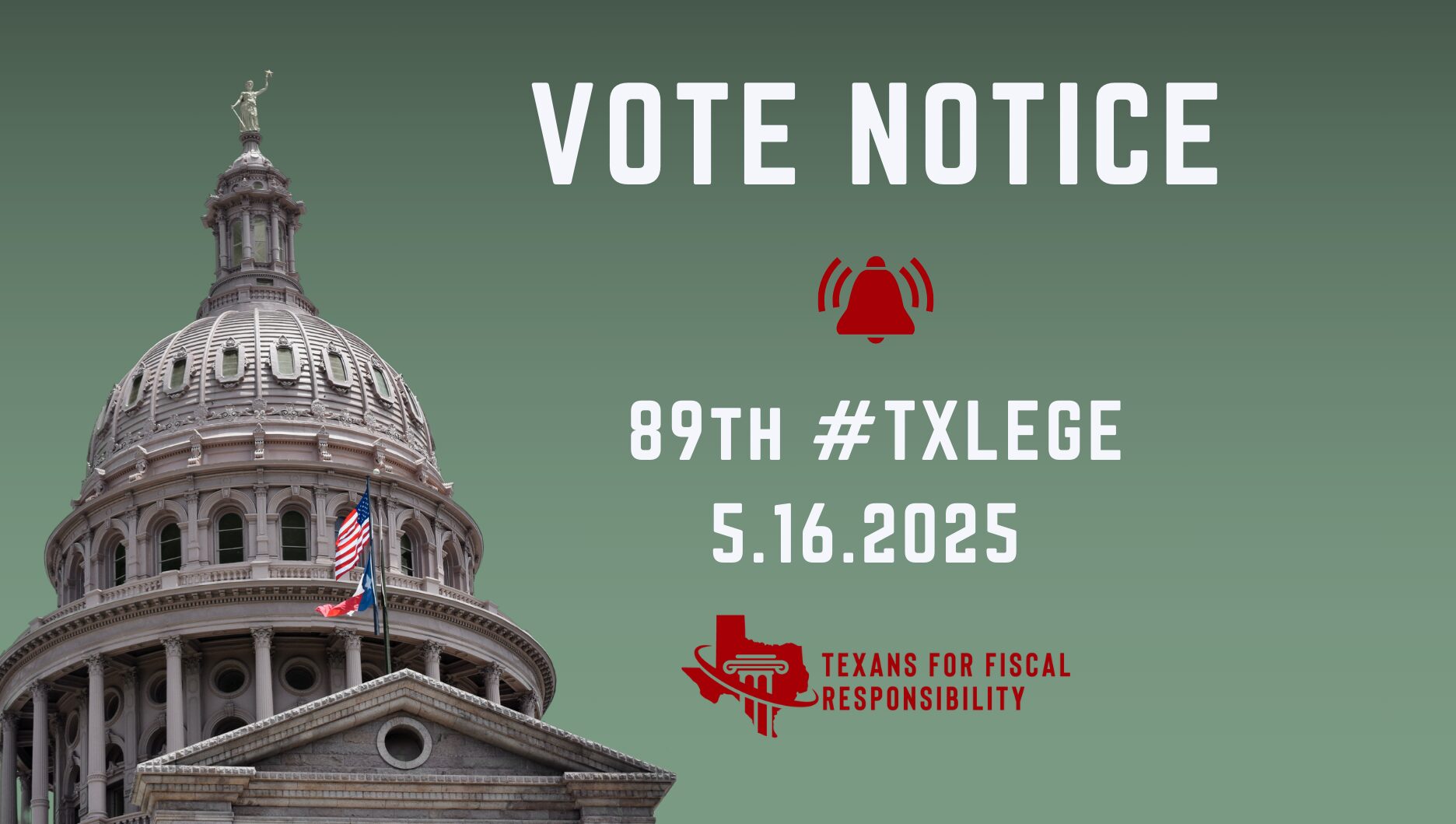
Texans for Fiscal Responsibility has issued the following vote notice for May 16th, 2025
Texas House of Representatives
Subject: Senate Bill 984 (SB 984) – Expanded Right-to-try
- Author: State Sen. Paul Bettencourt (R-Houston)
- Caption: Relating to access to individualized investigational treatments for patients with life-threatening or severely debilitating illnesses.
- TFR Position: SUPPORT
- Background:
- SB 984 empowers patients with terminal or severely disabling conditions to access custom-made experimental treatments when no FDA-approved options remain. These treatments are based on the patient’s unique genetic profile and must be recommended by a physician. Patients must give informed consent that details risks, expenses, and acknowledges that insurance may not cover the cost. The bill ensures that providers and manufacturers offering such care are protected from lawsuits and regulatory penalties when acting in good faith. It also bars government interference in a patient’s lawful access to these therapies. Importantly, the bill requires no government spending or new coverage mandates, preserving fiscal discipline. This limited, patient-driven approach aligns with pro-taxpayer, limited government values by avoiding new entitlements while expanding individual medical freedom.
Subject: Senate Bill 2448 (SB 2448) – New rural workforce grant program
- Author: State Sen. Kevin Sparks (R-Midland)
- Caption: Relating to the establishment of the Rural Workforce Development Grant Program.
- TFR Position: OPPOSE
- Background:
- SB 2448 would set up a new government grant program to funnel taxpayer money through nonprofit organizations that offer technical assistance to rural schools and colleges. It leaves key decisions about funding levels to future legislative discretion, increasing the risk of unchecked spending growth. Moreover, it prioritizes nonprofits as middlemen, potentially reducing transparency and efficiency. The bill allows for donations but also opens the door to public funding without clear limitations. From a fiscally conservative standpoint, the bill expands government intervention in workforce development, something better left to the private sector, and could lead to increased spending of taxpayer money. Ultimately, this measure invites bigger government with vague promises of return on investment.
Subject: Senate Bill 843 (SB 843) – Database for School bonds
- Author: State Sen. Lois Kolkhorst (R-Brenham)
- Caption: Relating to a Texas Education Agency database of school district bonds, taxes, and bond-related projects.
- TFR Position: SUPPORT
- Background:
- SB 843 takes an important step toward government transparency by requiring the Texas Education Agency to create a searchable, online database tracking school bond debt, related taxes, and capital projects. This move gives taxpayers better visibility into how local school districts are spending billions in borrowed funds and how these decisions impact property tax bills. It helps hold school boards accountable for bond elections and ensures that voters are not left in the dark about long-term financial obligations. By collecting the data and making it publicly accessible, the bill helps limit waste, prevent hidden tax hikes, and empower voters with facts. It also creates a standardized system for oversight, allowing citizens and lawmakers to compare spending trends across districts. It is a common sense, pro-taxpayer reforms to prevent fiscal mismanagement and provide the clarity taxpayers deserve.
Subject: Senate Bill 402 (SB 402) – Streamlining Property Tax Refunds
- Author: State Sen. Angela Paxton (R-McKinney)
- Caption: Relating to the payment of certain ad valorem tax refunds.
- TFR Position: SUPPORT
- Background:
- SB 402 promotes fiscal responsibility by increasing transparency and efficiency in the property tax refund process, ensuring taxpayer money is correctly distributed. By mandating a standardized form, the bill reduces administrative confusion and streamlines refund payments, minimizing errors and unnecessary bureaucracy. The inclusion of fraud prevention measures protects taxpayers from potential abuse, ensuring refunds go to the rightful recipients. Additionally, the ability to designate an alternative address provides flexibility for property owners. For these reasons, TFR supports SB 402.
Subject: Senate Bill 2112 (SB 2112) – Oyster farm penalties
- Author: State Sen. Lois Kolkhorst (R-Brenham)
- Caption: Relating to the punishment for certain criminal offenses related to cultivated oyster mariculture; increasing a criminal penalty.
- TFR Position: OPPOSE
- Background:
- SB 2112 increases criminal penalties for people who repeatedly violate Texas oyster mariculture laws, such as operating without a permit or breaking rules set by state agencies. While first-time penalties remain unchanged, the bill escalates repeat offenses to higher misdemeanor levels, depending on the violation. Rather than addressing noncompliance through civil fines or administrative remedies, the bill leans heavily on criminal prosecution as its enforcement tool. This approach grows the burden on the criminal justice system, increases taxpayer-funded enforcement costs, and risks criminalizing small business missteps that could be better handled through regulatory reform or administrative penalties.
Texas Senate
Subject: Senate Bill 1798 (SB 1798) – End In-state tuition for illegals
- Author: State Sen. Mayes Middleton (R-Galveston)
- Caption: Relating to the resident status, tuition rates, certain financial support, and certain documentation requirements for students enrolled at public institutions of higher education, including students not lawfully present in the United States.
- TFR Position: SUPPORT
- Background:
- SB 1798 eliminates the practice of offering in-state tuition and state financial aid to illegal immigrants. It ensures that taxpayer-funded financial assistance, such as lower tuition rates, grants and scholarships, are reserved only for U.S. citizens or lawful residents. Colleges and universities must verify students’ legal status before awarding aid or granting residency status for tuition purposes. Institutions that violate these rules will be penalized and may lose future state funding. By closing this loophole, the bill promotes accountability, ends one of many magnets for future illegal immigration, and safeguards taxpayer money from subsidizing benefits for those not lawfully present. It also enhances transparency by requiring regular reporting and independent audits. This legislation reflects a fiscally responsible approach, prioritizing citizens and legal residents. It aligns with limited government principles by curbing inappropriate public spending through stricter eligibility enforcement.
Subject: Senate Bill 3070 (SB 3070) – Abolish Lottery Commission, Move Lottery to TDLR
- Author: State Sen. Bob Hall (R-Edgewood)
- Caption: Relating to the abolishment of the Texas Lottery Commission and the transfer of the administration of the state lottery and the licensing and regulation of charitable bingo to the Texas Commission of Licensing and Regulation; creating a criminal offense.
- TFR Position: SUPPORT / AMEND
- Background:
- SB 3070 eliminates the Texas Lottery Commission and hands over its duties to the Texas Commission of Licensing and Regulation, aiming to improve transparency and accountability. The bill calls for a sunset review to evaluate whether the lottery should continue to exist past 2027. It prohibits selling lottery tickets online or through mobile apps, and caps physical ticket sales to 100 per transaction. This aims to curtail abuse, fraud, and exploitation, particularly of vulnerable and low-income Texans. The bill mandates annual audits, public disclosure of policymaking meetings, and strong documentation retention, strengthening financial oversight. It blocks automatic contract renewals and limits who can be licensed or employed based on criminal background and other risk factors. A new advisory committee will provide independent input on lottery operations. From a fiscally conservative standpoint, this bill helps to reins in a regulatory agency found to be corrupt and wasteful, curbs cronyism in vendor contracts, and positions the state to potentially end the lottery altogether. However, TFR recommends going a step further, and amending the legislation to end the lottery now, as the government-run Texas Lottery is not within the proper role of limited government, but rather a state-sanctioned gambling enterprise that preys on low-income Texans.
Subject: House Bill 34 (HB 34) – Bans investment in hostile nations
- Author: State Rep. Will Metcalf (R-Montgomery)
- Caption: Relating to prohibiting the investment of state money in certain countries and in certain private business entities in those countries.
- TFR Position: SUPPORT
- Background:
- HB 34 protects Texas taxpayers by helping to ensure public funds are not invested in nations that pose a threat to U.S. national security, like China and Iran. The bill adds safeguards by requiring divestment from certain companies tied to these countries, preventing Texas from unintentionally funding adversarial governments. It also allows the governor, in consultation with state security officials, to expand the list as global threats evolve. This proactive measure helps to minimizes financial risk, promotes economic security, and prevents public dollars from supporting hostile regimes. The bill promotes responsible state investing and ensures taxpayer funds are aligned with Texas’ security and values.
Subject: House Bill 130 (HB 130) – Protects Texas genetic data
- Author: State Rep. Greg Bonnen (R-Friendswood)
- Caption: Relating to genetic information security for residents of this state; providing a civil penalty; providing a private cause of action.
- TFR Position: SUPPORT
- Background:
- HB 130 protects Texans’ genetic data from being exploited by hostile foreign governments. The bill bans state-funded or Texas-based entities from using genome sequencing technology made by or linked to foreign adversaries like China. It requires that any genomic data from Texas residents be securely stored on U.S. soil, shielded from unauthorized access through strong encryption and cybersecurity practices. By preventing potential misuse of sensitive health data, the bill enhances national and state security. It holds violators financially accountable with significant civil penalties and empowers Texans to sue if harmed. This reduces state liability, ensures taxpayer dollars do not inadvertently fund foreign influence, and promotes limited government by enforcing clear rules without creating new bureaucracies.
Subject: House Bill 647 (HB 647) – Drivers License Updates post-surgery
- Author: State Rep. Jared Patterson (R-Frisco)
- Caption: Relating to the removal of certain restrictions imposed on driver’s licenses; authorizing a fee.
- TFR Position: SUPPORT
- Background:
- HB 647 removes unnecessary red tape for Texans who no longer need corrective lenses after surgery. It allows them to update their driver’s license by simply submitting a doctor’s note and a small fee, avoiding a visit to a government office. It’s a practical reform that respects personal responsibility and medical advancements without growing government. It maintains public safety while reducing bureaucratic friction and modernizing DPS processes. By offering both electronic and mail-in options, it increases efficiency and accessibility.
Subject: House Bill 668 (HB 668) – One-year LTC renewal grace period
- Author: State Rep. Cecil Bell (R-Magnolia)
- Caption: Relating to the renewal of a license to carry a handgun.
- TFR Position: SUPPORT
- Background:
- HB 668 provides a practical fix for law-abiding Texans who unintentionally let their handgun licenses expire. Rather than forcing these individuals to jump through costly and redundant bureaucratic hoops, the bill creates a one-year grace period for license renewal. This saves time, avoids duplicative government processing, and respects the rights of gun owners. The renewal still requires confirmation of key information. This measure prevents wasteful reprocessing and reduces administrative burdens. It aligns with limited-government principles by eliminating unnecessary red tape. Overall, it streamlines licensing while maintaining respecting Second Amendment rights.
Subject: House Bill 2003 (HB 2003) – High-speed Rail transparency
- Author: State Rep. Cody Harris (R-Palestine)
- Caption: Relating to provision to the Texas Department of Transportation of information regarding certain high-speed rail projects.
- TFR Position: SUPPORT
- Background:
- HB 2003 requires developers of high-speed rail projects to submit annual updates to the Texas Department of Transportation while their projects remain under state consideration. These updates must include financing plans, construction schedules, projected ridership, and foreign investment disclosures. The goal is to ensure transparency, particularly for landowners affected by eminent domain threats from long-stalled rail plans. By mandating public disclosure online, the bill gives taxpayers, investors, and property owners insight into the viability and status of costly rail proposals. This limits the potential for speculative or inactive projects to hold property hostage without scrutiny. HB 2003 promotes accountability, prevents misuse of eminent domain authority, and ensures that public infrastructure plans do not become boondoggles or vehicles for foreign influence.
Subject: House Bill 2788 (HB 2788) – Protects fraud detection tools
- Author: State Rep. Angie Button (R-Garland)
- Caption: Relating to the disclosure of certain fraud detection information obtained in the administration of the unemployment compensation system.
- TFR Position: SUPPORT
- Background:
- HB 2788 protects the fraud prevention methods used by the Texas Workforce Commission from being exposed through open records requests. By shielding internal protocols, assessments, and investigative tools from public release, the bill ensures that fraudsters cannot game the system. This enhances the integrity of Texas’ unemployment compensation program and safeguards taxpayer dollars from abuse. For fiscally conservative advocates, this measure supports government efficiency by helping reduce fraudulent claims and administrative waste. The bill is tightly scoped to cover only information related to fraud prevention, not general operations, and it does not expand government authority or create new bureaucracy. This is a proactive, defensive move that can help avoid expensive fraud investigations down the road.
Subject: House Bill 3611 (HB 3611) – Increased penalties for signage
- Author: State Rep. Pat Curry (R-Waco)
- Caption: Relating to the civil penalty for certain signs placed on the right-of-way of a public road.
- TFR Position: OPPOSE / AMEND
- Background:
- HB 3611 seeks to deter illegal signage by increasing civil penalties, but the bill raises concerns. While reducing visual clutter and ensuring road safety are legitimate goals, the bill expands enforcement authority, and the increased fines may disproportionately impact small businesses while larger businesses can absorb the costs as a routine expense. To improve the bill, lawmakers should also ensure that only those who directly authorize or direct the placement of the signage are held responsible, not the businesses advertised or other individuals.
Subject: House Bill 3700 (HB 3700) – DOGE the TWC
- Author: State Rep. Hubert Vo (D-Houston)
- Caption: Relating to the prevention, detection, and investigation of fraud, waste, and abuse in programs administered by the Texas Workforce Commission or by the commission’s contractors or grantees.
- TFR Position: SUPPORT
- Background:
- HB 3700 requires the Texas Workforce Commission (TWC) to create a formal process to detect and prevent fraud, waste, and abuse in all its programs, including those managed by outside contractors or grant recipients. The agency must build systems to identify suspicious activity and ensure a streamlined method for the public and stakeholders to report such issues—especially via an online reporting system. This reform fills a current gap, as only a few TWC programs had statutory anti-fraud requirements. This bill strengthens oversight and accountability without creating new bureaucracy or expanding government scope. By proactively addressing waste and inefficiencies, it safeguards taxpayer dollars and improves program integrity.
Reminder: Vote Notices are provided to both Texas state lawmakers and the general public, sharing Texans for Fiscal Responsibility’s position on issues eligible to be rated as a part of the Fiscal Responsibility Index. Notices are provided prior to votes being taken in each legislative chamber.
Disclaimer: We reserve the right to consider amendments to legislation that may be introduced without notice as a part of issues to be rated on the Fiscal Responsibility Index. We will make every effort to provide notice on amendments that are pre-filed.




